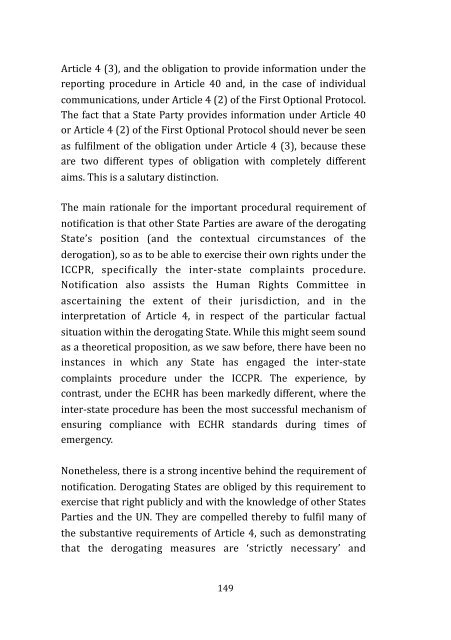States of Emergency - Centre for Policy Alternatives
States of Emergency - Centre for Policy Alternatives
States of Emergency - Centre for Policy Alternatives
You also want an ePaper? Increase the reach of your titles
YUMPU automatically turns print PDFs into web optimized ePapers that Google loves.
Article 4 (3), and the obligation to provide in<strong>for</strong>mation under the<br />
reporting procedure in Article 40 and, in the case <strong>of</strong> individual<br />
communications, under Article 4 (2) <strong>of</strong> the First Optional Protocol.<br />
The fact that a State Party provides in<strong>for</strong>mation under Article 40<br />
or Article 4 (2) <strong>of</strong> the First Optional Protocol should never be seen<br />
as fulLilment <strong>of</strong> the obligation under Article 4 (3), because these<br />
are two different types <strong>of</strong> obligation with completely different<br />
aims. This is a salutary distinction.<br />
The main rationale <strong>for</strong> the important procedural requirement <strong>of</strong><br />
notiLication is that other State Parties are aware <strong>of</strong> the derogating<br />
State’s position (and the contextual circumstances <strong>of</strong> the<br />
derogation), so as to be able to exercise their own rights under the<br />
ICCPR, speciLically the inter‐state complaints procedure.<br />
NotiLication also assists the Human Rights Committee in<br />
ascertaining the extent <strong>of</strong> their jurisdiction, and in the<br />
interpretation <strong>of</strong> Article 4, in respect <strong>of</strong> the particular factual<br />
situation within the derogating State. While this might seem sound<br />
as a theoretical proposition, as we saw be<strong>for</strong>e, there have been no<br />
instances in which any State has engaged the inter‐state<br />
complaints procedure under the ICCPR. The experience, by<br />
contrast, under the ECHR has been markedly different, where the<br />
inter‐state procedure has been the most successful mechanism <strong>of</strong><br />
ensuring compliance with ECHR standards during times <strong>of</strong><br />
emergency.<br />
Nonetheless, there is a strong incentive behind the requirement <strong>of</strong><br />
notiLication. Derogating <strong>States</strong> are obliged by this requirement to<br />
exercise that right publicly and with the knowledge <strong>of</strong> other <strong>States</strong><br />
Parties and the UN. They are compelled thereby to fulLil many <strong>of</strong><br />
the substantive requirements <strong>of</strong> Article 4, such as demonstrating<br />
that the derogating measures are ‘strictly necessary’ and<br />
149











